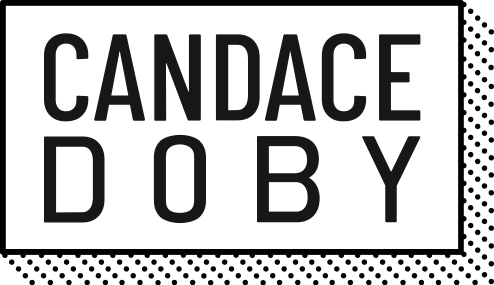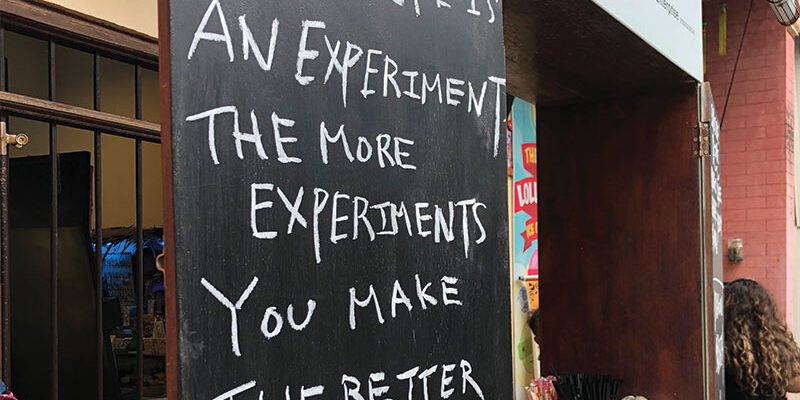One day in 2018, I walked the streets of Kuala Lumpur and stumbled upon a vendor with a sign on his cart. It read, “All life is an experiment. The more experiments you make, the better you are.”
He was selling create-your-own snow cones and may or may not have offered me one. I can’t recall because the quote commanded most of my attention.
I had never considered life as an experiment … maybe an adventure or, at times, a struggle. But, experiment?
I grabbed a photo of the sign because I knew it was meaningful but hadn’t figured out exactly what meaning I would attach to it … until now. Through my work, I have come to understand that leveraging courage to tap into the fullness of potential requires an experimenter’s mindset. Here’s how the the experimenter’s process and the courage process align and lead to exploration.
Begin with inquiry.
When a scientist conducts an experiment in her lab, she often begins with a question for which she is trying to uncover the answer. She might ask, “does the color of a room affect human behavior?” or “Do women feel more powerful after listening to Beyoncé’s music?” Questions like these lead her to make observations, gather information, form theories and investigate them. Curiosity, then, is the foundation of the test and, ultimately, the trigger for discovery. It’s the first step in adopting an experimenter’s mindset.
Similarly, curiosity invites courage to the surface to help us engage with possibilities that can only be found within uncertainty. It isn’t until we deliberately ask ourselves or quietly consider questions like, “How would I perform in that leadership role?” or “What if there was a different process?” that we open space for courage to join us on the uncertain journey of discovery. The process of courage, similar to the process of an experimentation, begins with a spark of an idea or change in awareness that calls you to wonder and explore.
Focus on the process.
Much of the work that comes after the inquiry is focused on the process of the experiment, or the method. A scientist may work for days, weeks or months designing and executing an experiment to ensure she isolates specific variables, captures the right data, has a solid measuring technique, and eliminates bias. She knows the reliability and validity of her experiment is directly connected to the rigor of her process, so the process is where she dedicates her attention. It’s a valuable insight that also applies to courage. Courage is an adaptive process that involves properly weighing the risks in front of you as well as the motivations and resources inside of you to better position yourself to follow the path of right action. It is the process a person goes through before, during and after a hard conversation with a teammate who made an insensitive comment or with a friend who habitually violates boundaries. Courage is not the result of the conversation. Like the experimenter, it is important for people who want to leverage courage to focus on the process.
Detach from outcome.
If a scientist approached an experiment committed to achieving a particular outcome, she could taint the test with researcher’s bias, which occurs when, “systematic error is introduced into sampling or testing by selecting or encouraging one outcome or answer over others.” Scientists can implement a range of checks and balances to reduce the presence of bias; one of the most valuable of those is detaching from the outcome.
Separation from outcome doesn’t equate to a reduction in eagerness, desire or intention. It clarifies, though, where those qualities should find expression: within the process, not the result. Additionally, detaching from outcome doesn’t mean the experimenter loses curiosity about the outcome. Rather, she resolves that it will be whatever it will be. Detaching from the outcome is also critical to courage because courage doesn’t guarantee success. It never has and never will. Courage, instead, opens the door to freedom, growth and possibility. When we detach from outcome, we simultaneously disarm fear — which aggressively tries to prevent less-than-ideal outcomes. Fear is inhibited from doing dirty work when we lift the veil of expectation.
Receive the gift of information.
When it’s all said and done, a scientist’s hypothesis may not be supported by the results of the experiment. That doesn’t mean, however, that she doesn’t take value away from the test. She does. She takes away information that was once unknown — information that can be applied to future experiments and expand her curiosity. In the same way, courage gives the person who conjures it the gift of information — information about what is possible, what the actor is capable of and how reliable their skills are.
The Bottom Line
I get it now — the sign on the vendor’s cart. “All life is an experiment. The more experiments you make, the better you are.” Having an experimenter’s mindset leads to growth and discovery, and growth and discovery often requires courage. Conjuring courage can be a complex process, but it can also be made easier if we follow an experimenter’s mindset and process.







